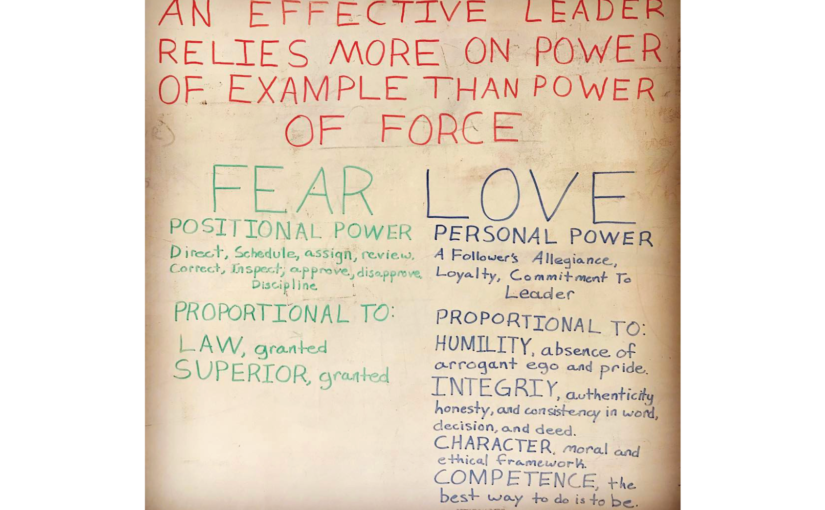Today’s picture is from a lesson to the Unit 5 Innovative Entrepreneur class. It was drawn to deconstruct a chapter on the leadership from Chief Hanna’s book Mastering Self: to Lead Self and Others.
In 1 Corinthians chapter 4, Paul helps us understand the responsibility and power of leadership. As I read through today’s chapter, Chief Hanna’s principles on the power of leadership continued to surface in Paul’s life.
Challenge: See if you can draw any similarities from Paul’s account and the image above as you read through the chapter. If you find any that you’d like to share, or any other scripture that comes to mind, put them in the comments.
I’ve included some takeaways from the reading below along with some other scripture that came to mind when reading it.
Let a man so account of us, as of the ministers of Christ, and stewards of the mysteries of God. Moreover it is required in stewards, that a man be found faithful.- 1Corinthians 4:1-2
A follower of Christ is a steward of the truth. The mysteries of God have been revealed plainly to us in the New Testament. (John 14:26) The steward’s job is to protect the truth from perversion and proclaim it unfettered. (2Timothy 1:14, Romans 1:16) The Word of God saves souls so I can see why it is important to steward it well, (James 1:21) but what does it mean to be a faithful steward?
But with me it is a very small thing that I should be judged of you, or of man’s judgment: yea, I judge not mine own self. For I know nothing by myself; yet am I not hereby justified: but he that judgeth me is the Lord. Therefore judge nothing before the time, until the Lord come, who both will bring to light the hidden things of darkness, and will make manifest the counsels of the hearts: and then shall every man have praise of God. – 1 Corinthians 4:3-5
Perhaps the first step in being faithful is to recognize who we are to be faithful to. We are not men pleasers but God pleasers. (Ephesians 6:6-8) We are slaves of God and we seek our Master’s glory. We trust his Word and are not ashamed of it. God is the only one fit to judge. Comparison is empty if left to us. Only One can compare rightly. The Sprit compares us to God’s word. This is a personal gift to help us each individually. In the same way, we should not try to unwrap a friend’s birthday gift, we should not attempt to unwrap the Spirit’s gift of comparing others to the Word. We only need protect the Word and proclaim it.
And these things, brethren, I have in a figure transferred to myself and to Apollos for your sakes; that ye might learn in us not to think of men above that which is written, that no one of you be puffed up for one against another. For who maketh thee to differ from another? and what hast thou that thou didst not receive? now if thou didst receive it, why dost thou glory, as if thou hadst not received it? Now ye are full, now ye are rich, ye have reigned as kings without us: and I would to God ye did reign, that we also might reign with you. – 1 Corinthians 4:6-8
Perhaps the second step in being faithful is to admit our position. We own nothing but that which God has given us. God has given us everything to steward for His glory.
For I think that God hath set forth us the apostles last, as it were appointed to death: for we are made a spectacle unto the world, and to angels, and to men. We are fools for Christ’s sake, but ye are wise in Christ; we are weak, but ye are strong; ye are honourable, but we are despised. Even unto this present hour we both hunger, and thirst, and are naked, and are buffeted, and have no certain dwelling place; And labour, working with our own hands: being reviled, we bless; being persecuted, we suffer it: Being defamed, we intreat: we are made as the filth of the world, and are the offscouring of all things unto this day. 1Corinthians 9-13
Paul’s proper view of himself places him at the bottom which gives him the personal power to minister, save souls, and bring glory to God.
I write not these things to shame you, but as my beloved sons I warn you. For though ye have ten thousand instructers in Christ, yet have ye not many fathers: for in Christ Jesus I have begotten you through the gospel. Wherefore I beseech you, be ye followers of me. For this cause have I sent unto you Timotheus, who is my beloved son, and faithful in the Lord, who shall bring you into remembrance of my ways which be in Christ, as I teach every where in every church. Now some are puffed up, as though I would not come to you. But I will come to you shortly, if the Lord will, and will know, not the speech of them which are puffed up, but the power. For the kingdom of God is not in word, but in power. What will ye? shall I come unto you with a rod, or in love, and in the spirit of meekness? – 1 Corinthians 4:14-21
Paul’s example is faithfulness. Words would not do, therefore Paul sent Timothy as a reminder of the power of a life. Wisdom is not knowing things. Wisdom is shown in a life lived well. (James 3:13) Paul warns that he will inspect lives and discern the presence or absence of the power of God.










